(完整word版)Unit 3 Out of step课文翻译综合教程三
- 格式:doc
- 大小:37.51 KB
- 文档页数:4
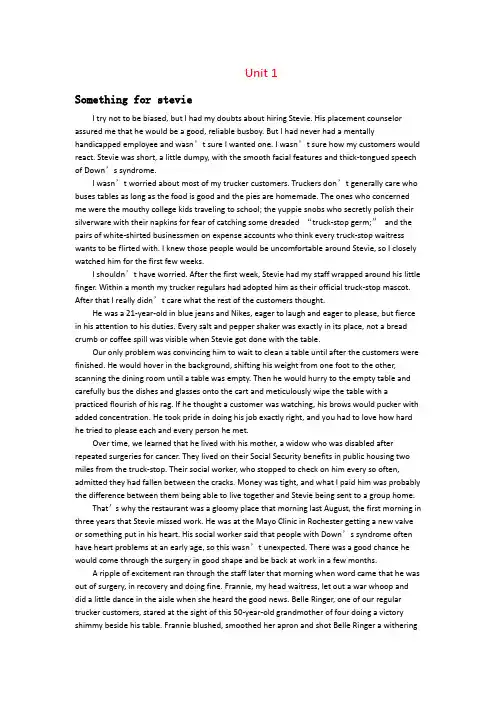
Unit 1Something for stevieI try not to be biased, but I had my doubts about hiring Stevie. His placement counselor assured me that he would be a good, reliable busboy. But I had never had a mentally handicapped employee and wasn’t sure I wanted one. I wasn’t sure how my customers would react. Stevie was short, a little dumpy, with the smooth facial features and thick-tongued speech of Down’s syndrome.I wasn’t worried about most of my trucker customers. Truckers don’t generally care who buses tables as long as the food is good and the pies are homemade. The ones who concerned me were the mouthy college kids traveling to school; the yuppie snobs who secretly polish their silverware with their napkins for fear of catching some dreaded “truck-stop germ;”and the pairs of white-shirted businessmen on expense accounts who think every truck-stop waitress wants to be flirted with. I knew those people would be uncomfortable around Stevie, so I closely watched him for the first few weeks.I shouldn’t have worried. After the first week, Stevie had my staff wrapped around his little finger. Within a month my trucker regulars had adopted him as their official truck-stop mascot. After that I really didn’t care what the rest of the customers thought.He was a 21-year-old in blue jeans and Nikes, eager to laugh and eager to please, but fierce in his attention to his duties. Every salt and pepper shaker was exactly in its place, not a bread crumb or coffee spill was visible when Stevie got done with the table.Our only problem was convincing him to wait to clean a table until after the customers were finished. He would hover in the background, shifting his weight from one foot to the other, scanning the dining room until a table was empty. Then he would hurry to the empty table and carefully bus the dishes and glasses onto the cart and meticulously wipe the table with a practiced flourish of his rag. If he thought a customer was watching, his brows would pucker with added concentration. He took pride in doing his job exactly right, and you had to love how hard he tried to please each and every person he met.Over time, we learned that he lived with his mother, a widow who was disabled after repeated surgeries for cancer. They lived on their Social Security benefits in public housing two miles from the truck-stop. Their social worker, who stopped to check on him every so often, admitted they had fallen between the cracks. Money was tight, and what I paid him was probably the difference between them being able to live together and Stevie being sent to a group home.That’s why the restaurant was a gloomy place that morning last August, the first morning in three years that Stevie missed work. He was at the Mayo Clinic in Rochester getting a new valve or something put in his heart. His social worker said that people with Down’s syndrome often have heart problems at an early age, so this wasn’t unexpected. There was a good chance he would come through the surgery in good shape and be back at work in a few months.A ripple of excitement ran through the staff later that morning when word came that he was out of surgery, in recovery and doing fine. Frannie, my head waitress, let out a war whoop and did a little dance in the aisle when she heard the good news. Belle Ringer, one of our regular trucker customers, stared at the sight of this 50-year-old grandmother of four doing a victory shimmy beside his table. Frannie blushed, smoothed her apron and shot Belle Ringer a witheringlook.9 He grinned. “OK, Frannie, what was that all about?”he asked.10 “We just got word that Stevie is out of surgery and going to be okay.”she responded.“I was wondering where he was,”said Belle. “I had a new joke to tell him. What was the surgery about?”12 Frannie quickly told him and the other two drivers sitting at his booth about Stevie’s surgery, then sighed. “Yeah, I’m glad he is going to be okay,”she said, “but I don’t know how he and his mom are going to handle all the bills. From what I hear, they’re barely getting byas it is.”Belle Ringer nodded thoughtfully, and Frannie hurried off to wait on the rest of her tables.After the morning rush, Frannie walked into my office. She had a couple of paper napkins in her hand and a funny look on her face. “What’s up?”I asked. “That table where Belle Ringer and his friends were sitting,”she said, “this was folded and tucked under a coffee cup.”She handed the napkin to me, and three $20 bills fell onto my desk when I opened it. On the outside, in big, bold letters, was printed “Something For Stevie.”“Pony Pete also asked me what that dance was all about,”she said, “so I told him about Stevie and his mom and everything, and Pete looked at Tony and Tony looked at Pete, and they ended up giving me this.”She handed me another paper napkin that had “Something For Stevie”scrawled on its outside. Two $50 bills were tucked within its folds. Frannie looked at me with wet, shiny eyes, shook her head and said simply, “Truckers.”15 That was three months ago. Today is Thanksgiving, the first day Stevie is supposed to be back to work. His placement worker said he’s been counting the days until the doctor said he could work, and it didn’t matter at all that it was a holiday. He called 10 times in the past week, making sure we knew he was coming, fearful that we had forgotten him or that his job was in jeopardy. I arranged to have his mother bring him to work. We met them in the parking lot and invited them both to celebrate his day back.Stevie was thinner and paler, but couldn’t stop grinning as he pushed through the doors and headed for the back room where his apron and busing cart were waiting. “Hold up there, Stevie, not so fast,”I said. I took him and his mother by their arms. “Work can wait for a minute. To celebrate you coming back, breakfast for you two is on me.”I led them toward a large corner booth at the rear of the room. I could feel and hear the rest of the staff following behind as we marched through the dining room. Glancing over my shoulder, I saw booth after booth of grinning truckers empty and join the procession.We stopped in front of the big table, its surface covered with a mess of coffee cups, saucers and dinner plates, all sitting crooked on dozens of folded paper napkins. “First thing you have to do, Stevie, is to clean up this mess,”I said, trying to sound stern. Stevie looked at me, and then at his mother, then pulled out one of the napkins. It had “Something for Stevie”written on the outside. As he picked it up, two $10 bills fell onto the table. Stevie stared at the money, then at dozens of napkins peeking from beneath the tableware, each with his name printed or scrawled on it.I turned to his mother. “There’s over $10,000 in cash and checks on that table, all from truckers and trucking companies that heard about your problems. Happy Thanksgiving!”Well, it got real noisy about that time, with everybody shouting, and there were a few tears, too. But you know what’s funny? While everybody else was busy shaking hands and hugging each other,Stevie, with a big, big smile on his face, was busy clearing all the cups and dishes from the table —the best worker I ever hired.送给史蒂维的一点心意1 我力求不存偏见,不过在雇用史蒂维时我有理由心存疑虑。

unit 1 Mr. Doherty Builds His Dream LifeIn America many people have a romantic idea of life in the countryside. Many living in towns dream of starting up their own farm, of living off the land. Few get round to putting their dreams into practice. This is perhaps just as well, as the life of a farmer is far from easy, as Jim Doherty discovered when he set out to combine being a writer with running a farm. Nevertheless, as he explains, he has no regrets and remains enthusiastic about his decision to change his way of life.在美国,不少人对乡村生活怀有浪漫的情感。
许多居住在城镇的人梦想着自己办个农场,梦想着靠土地为生。
很少有人真去把梦想变为现实。
或许这也没有什么不好,因为,正如吉姆·多尔蒂当初开始其写作和农场经营双重生涯时所体验到的那样,农耕生活远非轻松自在。
但他写道,自己并不后悔,对自己作出的改变生活方式的决定仍热情不减。
Mr. Doherty Builds His Dream LifeJim Doherty1 There are two things I have always wanted to do -- write and live on a farm. Today I'm doing both. I am not in E. B. White's class as a writer or in my neighbors' league as a farmer, but I'm getting by. And after years of frustration with city and suburban living, my wife Sandy and I have finally found contentment here in the country. 多尔蒂先生创建自己的理想生活吉姆·多尔蒂有两件事是我一直想做的――写作与务农。
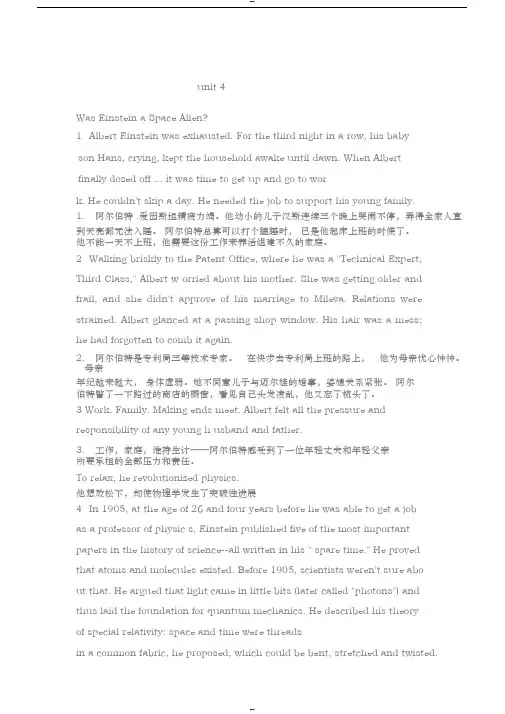
unit 4Was Einstein a Space Alien?1Albert Einstein was exhausted. For the third night in a row, his babyson Hans, crying, kept the household awake until dawn. When Albertfinally dozed off ... it was time to get up and go to work. He couldn't skip a day. He needed the job to support his young family.1.阿尔伯特 .爱因斯坦精疲力竭。
他幼小的儿子汉斯连续三个晚上哭闹不停,弄得全家人直到天亮都无法入睡。
阿尔伯特总算可以打个瞌睡时,已是他起床上班的时候了。
他不能一天不上班,他需要这份工作来养活组建不久的家庭。
2Walking briskly to the Patent Office, where he was a "Technical Expert,Third Class," Albert w orried about his mother. She was getting older andfrail, and she didn't approve of his marriage to Mileva. Relations were strained. Albert glanced at a passing shop window. His hair was a mess;he had forgotten to comb it again.2.阿尔伯特是专利局三等技术专家。
在快步去专利局上班的路上,他为母亲忧心忡忡。
母亲年纪越来越大,身体虚弱。
她不同意儿子与迈尔娃的婚事,婆媳关系紧张。
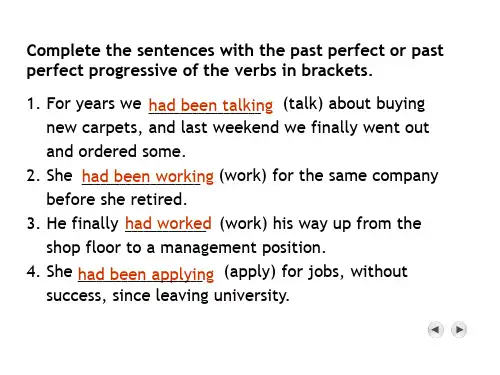

Unit 3 Out of step练习答案综合教程三Unit 3 Out of Step 练习答案综合教程三 Unit 3 Out of Step 练习答案题目:Unit 3 Out of Step 练习答案综合教程三Outline:I. IntroductionII. Exercise AnswersA. VocabularyB. ComprehensionC. GrammarIII. ConclusionI. Introduction综合教程三的第三单元是"Out of Step"。
本单元主要讲述了人们的意见、偏好以及个性的不同所引发的争议和冲突。
这篇文章旨在提供练习答案,以帮助读者巩固对这一单元内容的理解。
II. Exercise AnswersA. Vocabulary1. Controversial- Meaning: Causing disagreement or discussion.- Sentence: The controversial issue of abortion has been a topic of heated debate for years.2. Diversity- Meaning: The state of having a variety of different people or things.- Sentence: The university values diversity and encourages students from all backgrounds to apply.3. Generation gap- Meaning: Differences in opinions, attitudes, and behaviors between older and younger generations.- Sentence: There is often a generation gap between parents and their teenage children due to differences in upbringing.4. Conformity- Meaning: Compliance with accepted standards, rules, or norms.- Sentence: The pressure to conform to society's expectations can be overwhelming for some individuals.5. Individualism- Meaning: The belief in the importance of the individual and the value of personal freedom.- Sentence: The country's culture promotes individualism and encourages people to pursue their own dreams and goals.B. Comprehension1. In what ways do people express their individuality?- People express their individuality through their choices of clothing, hairstyle, hobbies, and personal beliefs.2. What are some advantages and disadvantages of conformity?- Advantages: Conformity can create a sense of unity and cooperation within a group, making it easier to achieve common goals.- Disadvantages: Conformity can stifle creativity and discourage critical thinking, leading to a lack of innovation.3. How does the generation gap affect family relationships?- The generation gap can lead to misunderstandings and conflicts between parents and children, as they may have different values, beliefs, and communication styles.C. Grammar1. Complete the sentence with the correct form of the verb "see" or "look".- She saw a shooting star last night.- Look at that beautiful sunset!2. Rewrite the sentence using the reported speech.- Direct speech: "I will help you with your homework," said Sarah.- Reported speech: Sarah said she would help me with my homework.3. Choose the correct word to complete the sentence.- I can't decide which dress to wear to the party.4. Fill in the blanks with the appropriate prepositions.- I'm going to the concert with my friends.III. Conclusion本文提供了关于综合教程三第三单元"Out of Step"的练习答案。
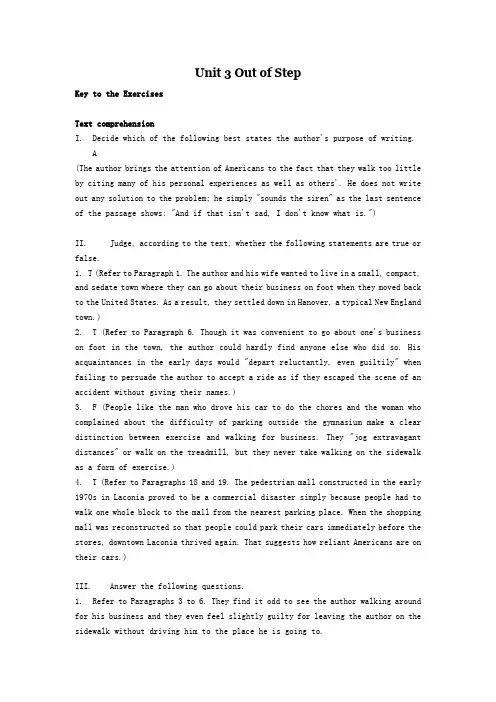
Unit 3 Out of StepKey to the ExercisesText comprehensionI. Decide which of the following best states the author's purpose of writing.A(The author brings the attention of Americans to the fact that they walk too little by citing many of his personal experiences as well as others'. He does not write out any solution to the problem; he simply "sounds the siren" as the last sentence of the passage shows: "And if that isn't sad, I don't know what is.")II. Judge, according to the text, whether the following statements are true or false.1. T (Refer to Paragraph 1. The author and his wife wanted to live in a small, compact, and sedate town where they can go about their business on foot when they moved back to the United States. As a result, they settled down in Hanover, a typical New England town.)2. T (Refer to Paragraph 6. Though it was convenient to go about one's business on foot in the town, the author could hardly find anyone else who did so. His acquaintances in the early days would "depart reluctantly, even guiltily" when failing to persuade the author to accept a ride as if they escaped the scene of an accident without giving their names.)3. F (People like the man who drove his car to do the chores and the woman who complained about the difficulty of parking outside the gymnasium make a clear distinction between exercise and walking for business. They "jog extravagant distances" or walk on the treadmill, but they never take walking on the sidewalk as a form of exercise.)4. T (Refer to Paragraphs 18 and 19. The pedestrian mall constructed in the early 1970s in Laconia proved to be a commercial disaster simply because people had to walk one whole block to the mall from the nearest parking place. When the shopping mall was reconstructed so that people could park their cars immediately before the stores, downtown Laconia thrived again. That suggests how reliant Americans are on their cars.)III. Answer the following questions.1. Refer to Paragraphs 3 to 6. They find it odd to see the author walking around for his business and they even feel slightly guilty for leaving the author on the sidewalk without driving him to the place he is going to.2. Refer to Paragraphs 2, 3 and 7. Ordinary Americans, even in this agreeable and easy place to go about on foot, have virtually never done so. In fact, in the ., people have got accustomed to using the car for everything.3. Refer to Paragraphs 7 to 9. The American people have come to depend on cars for almost everything to the extent that they have forgotten about what they can do with their legs. Sometimes, they would take great and ridiculous trouble with driving rather than take an easy walk.4. Refer to Paragraph 14. According to an editorial in The Boston Globe, the . has spent less than one percent of its transportation budget on facilities for pedestrians. The government, in this sense, has basically ignored the need for pedestrians, which has caused some trouble for the author and discouraged people from going about on their business on foot.5. Refer to Paragraphs 16 and 17. He is sad because he has come to realize, from the case of Laconia, ., that people don't walk anywhere anymore in the country.IV. Explain in your own words the following sentences.1. People in the United States tend to drive for every purpose, so much so that they have forgotten that they still have legs and about what their legs can do.2. I admit that I had never realized how poorly equipped our bodies are in this respect.3. …Maybe I was the only person who had ever attempted to cross that intersection on foot.Structural analysis of the textThe author develops his ideas by means of examples. He cites factual and verifiable examples: the man he observed outside the post office, his conversation with an acquaintance of his who would drive to the gym to do exercises, his own effort to walk across the street and the commercial failure of the pedestrian mall in Laconia. These examples have made his idea more effective and convincing.Rhetorical features of the text1. "I confess it had not occurred to me how thoughtlessly deficient nature is in the regard." (Paragraph 13) (for self-debasement)2. "An acquaintance of ours was complaining the other day about the difficulty of finding a place to park outside the local gymnasium. She goes there several times a week to walk on a treadmill. The gymnasium is, at most, a six-minute walk from her front door." (Paragraph 10) (for satire on some ridiculous contradiction in a particular act)Vocabulary exercisesI. Explain the underlined part in each sentence in your own words.1. pleasant/comfortable, practically2. very long, (places of) physical exercises3. was made to realize this4. decided not to have coffee and instead to go (to the bookstore)5. held in mindII. Fill in the blank in each sentence with a word taken from the box in its appropriate form.1. negotiated2. debonair3. dodging4. notion5. compact6. contortion7. thrive 8. undertakingIII. Fill in the blanks with the appropriate forms of the given words.1. disagreeable2. eccentricity3. acquainted4. ridicule5. triumphal6. deficiencies7. woefully 8. contortedIV. Fill in the blank in each sentence with an appropriate phrasal verb or collocation taken from the text.1. going about2. going through3. pops out4. pace off5. pulled up6. dug out7. stroll up to 8. habituated toV. Give a synonym or an antonym of the word underlined in each sentence in the sense it is used.1. Antonym: bustling (exciting)2. Synonym: old (time-honored)3. Antonym: depressed (downhearted, low-spirited)4. Synonym: absurd (ridiculous)5. Antonym: indifferent (unconcerned)6. Synonym: infuriating (irritating)7. Antonym: failure (defeat)8. Synonym: againVI. Explain the underlined phrasal verbs in your own words.1. encountered2. cause3. agreed to4. limited to5. idling about6. relied on7. tolerate 8. deserted/abandonedGrammar exercisesI. Complete the sentences with the past perfect or the past perfect progressive of the verbs in brackets.1. had been talking2. had been working3. had worked4. had been applying5. had broken6. had been standing7. had swallowed8. had beenII. Complete the following sentences according to the given situation.1. has been empty2. had been working for the company3. had been waiting for me for half an hour4. had had lunch5. had left6. has been living7. had repaired the engine8. had toldIII. Put the verbs in brackets into the correct tense.had seen returned didn't have didn't havehad done was didn't have didleft had wasdecided picked went slammedfelt had reminded had searched foundremembered wereIV. Complete the following sentences with shall, should, will or would.1. will2. shall3. Should (Should ministers decide = If ministers should decide)4. would5. will (Will expresses strong intention.)6. shall (When shall is used with the third person, it suggests strong determination.)7. should8. should9. would (Here, we use would not to say that Mary is unwilling to or refuses to listen to the doctor.)10. would (Stressed would is used to criticize. It means "it is typical of you… )V. Fill in each blank with a word or phrase taken from the box.1. nowadays2. ages ago3. lately, just4. soon, after a long time5. immediately, Eventually6. once7. recently8. for weeksVI. Make sentences of your own after the sentences given below, keeping the italicized parts in your sentences.1. After standing in the queue for hours, we got good seats.I always feel better after talking to you.2. You look as if you knew each other.He lay still, as if shot.Translation exercisesI. Translate the following sentences into Chinese.1. 我几乎每天都步行到邮局、图书馆或书店,心情特别不错的时候,路过罗斯·杰可斯咖啡店还会进去喝上一杯卡布奇诺。
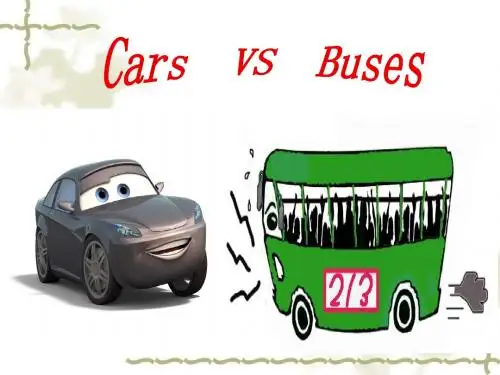
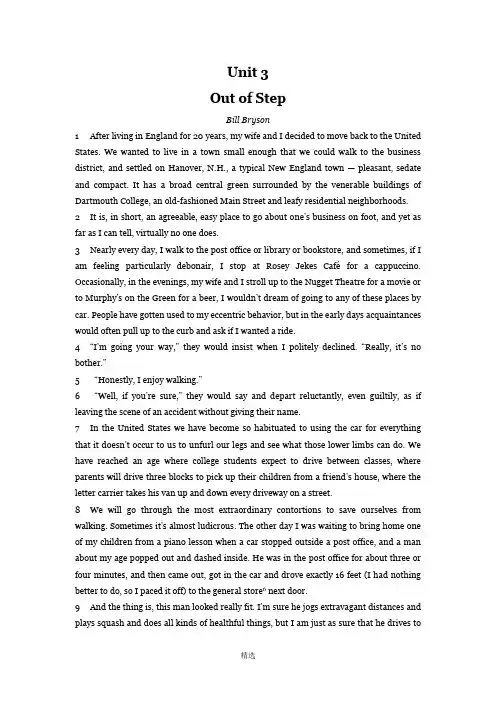
Unit 3Out of StepBill Bryson1After living in England for 20 years, my wife and I decided to move back to the United States. We wanted to live in a town small enough that we could walk to the business district, and settled on Hanover, N.H., a typical New England town —pleasant, sedate and compact. It has a broad central green surrounded by the venerable buildings of Dartmouth College, an old-fashioned Main Street and leafy residential neighborhoods.2It is, in short, an agreeable, easy place to go about o ne’s business on foot, and yet as far as I can tell, virtually no one does.3Nearly every day, I walk to the post office or library or bookstore, and sometimes, if I am feeling particularly debonair, I stop at Rosey Jekes Caféfor a cappuccino. Occasionally, in the evenings, my wife and I stroll up to the Nugget Theatre for a movie or to Murphy’s on the Green for a beer, I wouldn’t dream of going to any of these places by car. People have gotten used to my eccentric behavior, but in the early days acquaintances would often pull up to the curb and ask if I wanted a ride.4“I’m going your way,” they would insist when I politely declined. “Really, it’s no bother.”5“Honestly, I enjoy walking.”6“Well, if you’re sure,” they would say and depart reluctantly, even g uiltily, as if leaving the scene of an accident without giving their name.7In the United States we have become so habituated to using the car for everything that it doesn’t occur to us to unfurl our legs and see what those lower limbs can do. We have reached an age where college students expect to drive between classes, where parents will drive three blocks to pick up their children from a friend’s house, where the letter carrier takes his van up and down every driveway on a street.8We will go through the most extraordinary contortions to save ourselves from walking. Sometimes it’s almost ludicrous. The other day I was waiting to bring home one of my children from a piano lesson when a car stopped outside a post office, and a man about my age popped out and dashed inside. He was in the post office for about three or four minutes, and then came out, got in the car and drove exactly 16 feet (I had nothing better to do, so I paced it off) to the general store6 next door.9And the thing is, this man looked really fit. I’m sure he jogs extravagant distances and plays squash and does all kinds of healthful things, but I am just as sure that he drives toeach of these undertakings.10An acquaintance of ours was complaining the other day about the difficulty of finding a place to park outside the local gymnasium. She goes there several times a week to walk on a treadmill. The gymnasium is, at most, a six-minute walk from her front door.11I asked her why she didn’t walk to the gym and do six minutes less on the treadmill. 12She looked at me as if I were tragically simple-minded and said, “But I have a program for the treadmill. It records my distance and speed and calorie burn rate, and I can adjust it for degree of difficulty.”13I confess it had not occurred to me how thoughtlessly deficient nature is in this regard.14According to a concerned and faintly horrified 1997 editorial in the Boston Globe, the United States spent less than one percent of its transportation budget on facilities for pedestrians. Actually, I’m surprised i t was that much. Go to almost any suburb developed in the last 30 years, and you will not find a sidewalk anywhere. Often you won’t find a single pedestrian crossing.15I had this brought home to me one summer when we were driving across Maine and stopped for coffee in one of those endless zones of shopping malls, motels, gas stations and fast-food places. I noticed there was a bookstore across the street, so I decided to skip coffee and head over.16Although the bookshop was no more than 70 or 80 feet away, I discovered that there was no way to cross on foot without dodging over six lanes of swiftly moving traffic. In the end, I had to get in our car and drive across.17At the time, it seemed ridiculous and exasperating, but afterward I realized that I was possibly the only person ever to have entertained the notion of negotiating that intersection on foot.18The fact is, we not only don’t walk anywhere anymore in this country, we won’t walk anywhere, and woe to anyone who tries to make us, as the city of Laconia, N.H., discovered. In the early 1970s, Laconia spent millions on a comprehensive urban renewal project, which included building a pedestrian mall to make shopping more pleasant. Esthetically it was a triumph—urban planners came from all over to coo and take photos--but commercially it was a disaster. Forced to walk one whole block from a parking garage, shoppers abandoned downtown Laconia for suburban malls.19In 1994 Laconia dug up its pretty paving blocks, took away the tubs of geraniums and decorative trees, and brought back the cars. Now people can park right in front of the stores again, and downtown Laconia thrives anew.20And if that isn’t sad. I don’t know what is.不合拍比尔·布里森1.在英格兰住了20年之后,我和妻子决定搬回美国。
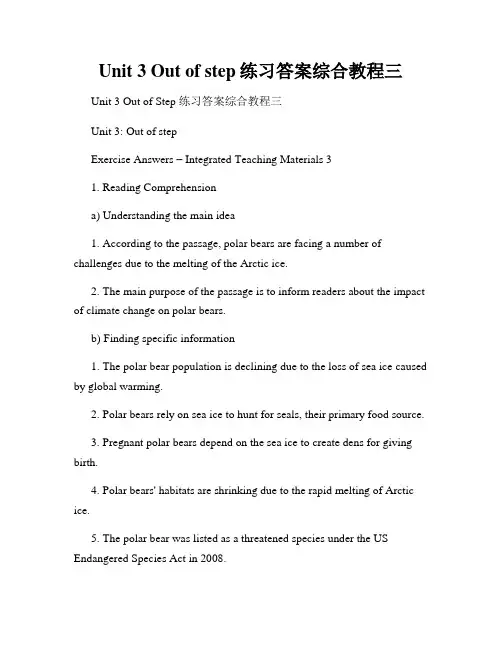
Unit 3 Out of step练习答案综合教程三Unit 3 Out of Step 练习答案综合教程三Unit 3: Out of stepExercise Answers – Integrated Teaching Materials 31. Reading Comprehensiona) Understanding the main idea1. According to the passage, polar bears are facing a number of challenges due to the melting of the Arctic ice.2. The main purpose of the passage is to inform readers about the impact of climate change on polar bears.b) Finding specific information1. The polar bear population is declining due to the loss of sea ice caused by global warming.2. Polar bears rely on sea ice to hunt for seals, their primary food source.3. Pregnant polar bears depend on the sea ice to create dens for giving birth.4. Polar bears' habitats are shrinking due to the rapid melting of Arctic ice.5. The polar bear was listed as a threatened species under the US Endangered Species Act in 2008.c) Identifying vocabulary in context1. Fragile - Polar bear populations are in danger of decline due to the melting ice.2. Diminishing - The size of the polar bear population is decreasing rapidly.3. Extinction - The loss of sea ice could lead to the extinction of polar bears.4. Thriving - Polar bears rely on sea ice to thrive in their natural habitat.d) Understanding the organizationIntroduction: The passage addresses the challenges faced by polar bears due to the melting of Arctic ice.Main body: The passage provides specific information about the impact of climate change on polar bears, including their declining population, dependence on sea ice for hunting and denning, and the shrinking of their habitats.Conclusion: The passage concludes by highlighting the need for urgent action to mitigate climate change and protect polar bears.2. Vocabulary Enrichmenta) Multiple-choice questions1. b) endangers2. a) vanish3. c) vulnerable4. d) disruption5. b) temporaryb) Forming sentences1. The rapid melting of the ice poses a serious threat to the survival of polar bears.2. Polar bears are facing the risk of extinction due to the loss of their natural habitat.3. The declining population of polar bears is a direct consequence of climate change.4. The sea ice provides a temporary platform for polar bears to hunt for seals.5. The disruption of the Arctic ecosystem will have far-reaching consequences.3. DiscussionSample answers:1. The melting of Arctic ice is a result of climate change, which is primarily caused by human activities such as burning fossil fuels and deforestation. Increased greenhouse gas emissions trap heat in the atmosphere, leading to rising temperatures and the melting of ice caps. This has a direct impact on polar bears, as they rely on sea ice to hunt for seals. The loss of ice means they have less access to their primary food source,which in turn leads to malnutrition and a declining population. Furthermore, pregnant polar bears depend on the sea ice to create dens for giving birth. Without the ice, their ability to reproduce and maintain stable populations is severely compromised. If urgent action is not taken to mitigate climate change and protect polar bears, they may face the risk of extinction in the near future.2. Climate change not only affects polar bears but also has broader implications for the entire Arctic ecosystem. As the ice melts, it disrupts the natural balance of the region, impacting other wildlife species as well. For example, the loss of sea ice affects the migration patterns of marine mammals, such as whales and seals, as well as fish populations. It also affects the availability of food for other predators, such as Arctic foxes and wolves, which rely on the polar bear's leftover kills. Additionally, the melting of Arctic ice contributes to rising sea levels globally, threatening coastal communities and ecosystems around the world. Therefore, it is crucial that we address the issue of climate change and take proactive measures to protect not only polar bears but also the entire planet's biodiversity and future.。

unit 1 Mr. Doherty Builds His Dream LifeIn America many people have a romantic idea of life in the countryside. Many living in towns dream of starting up their own farm, of living off the land. Few get round to putting their dreams into practice. This is perhaps just as well, as the life of a farmer is far from easy, as Jim Doherty discovered when he set out to combine being a writer with running a farm. Nevertheless, as he explains, he has no regrets and remains enthusiastic about his decision to change his way of life.在美国,不少人对乡村生活怀有浪漫的情感。
许多居住在城镇的人梦想着自己办个农场,梦想着靠土地为生。
很少有人真去把梦想变为现实。
或许这也没有什么不好,因为,正如吉姆·多尔蒂当初开始其写作和农场经营双重生涯时所体验到的那样,农耕生活远非轻松自在。
但他写道,自己并不后悔,对自己作出的改变生活方式的决定仍热情不减。
Mr. Doherty Builds His Dream LifeJim Doherty1 There are two things I have always wanted to do -- write and live on a farm. Today I'm doing both. I am not in E. B. White's class as a writer or in my neighbors' league as a farmer, but I'm getting by. And after years of frustration with city and suburban living, my wife Sandy and I have finally found contentment here in the country.有两件事是我一直想做的――写作与务农。
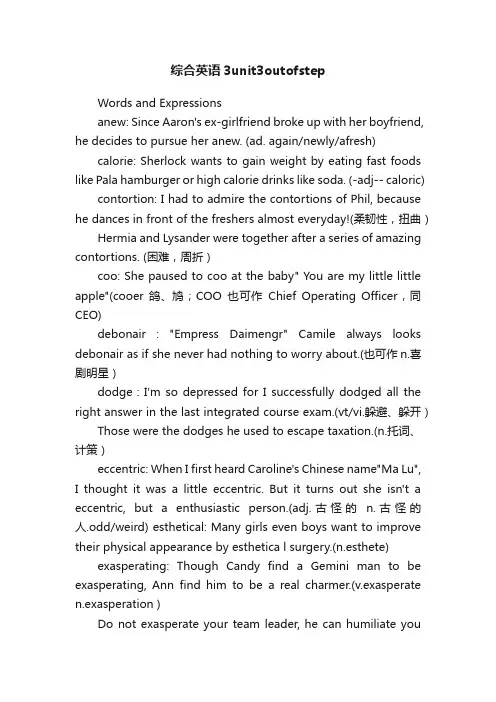
综合英语3unit3outofstepWords and Expressionsanew: Since Aaron's ex-girlfriend broke up with her boyfriend, he decides to pursue her anew. (ad. again/newly/afresh) calorie: Sherlock wants to gain weight by eating fast foods like Pala hamburger or high calorie drinks like soda. (-adj-- caloric) contortion: I had to admire the contortions of Phil, because he dances in front of the freshers almost everyday!(柔韧性,扭曲)Hermia and Lysander were together after a series of amazing contortions. (困难,周折)coo: She paused to coo at the baby" You are my little little apple"(cooer 鸽、鸠;COO也可作Chief Operating Officer,同CEO)debonair:"Empress Daimengr" Camile always looks debonair as if she never had nothing to worry about.(也可作n.喜剧明星)dodge:I'm so depressed for I successfully dodged all the right answer in the last integrated course exam.(vt/vi.躲避、躲开)Those were the dodges he used to escape taxation.(n.托词、计策)eccentric: When I first heard Caroline's Chinese name"Ma Lu", I thought it was a little eccentric. But it turns out she isn't a eccentric, but a enthusiastic person.(adj.古怪的n.古怪的人.odd/weird) esthetical: Many girls even boys want to improve their physical appearance by esthetica l surgery.(n.esthete) exasperating: Though Candy find a Gemini man to be exasperating, Ann find him to be a real charmer.(v.exasperate n.exasperation )Do not exasperate your team leader, he can humiliate youanywhere anytime!extravagant: Xie Tingfeng and Wang Fei spent over 100 hours extravagant time, which was the explosive news recently.(放纵的)He was extravagant in his admiration of Hellas.(过度的;奢侈的)habituate: You must habituate yourself to this police school life.Some experts said many things to habituate can be given up.(上瘾)ludicrous: When I was a fresher I thought it l udicrous that we can't use the quilt school gave us.(ridiculous/absurd/foolish) negotiate:I really want to negotiate with the team leader to refund our accommodation.The cilmber had to negotiate a steep rock face.(成功度过)pedestrian: Having been exposed by press, Yao Di was just a pedestrian A in Wen Zhang's life. The circumstances and events of his life were anything but pedestrian.(adj.平淡的)sedate: We continued our walk at a s edate pace.(平静的、不慌不忙的)She took them to visit her sedate, elderly cousins.(沉着的、不苟言笑的)Jessica was so excited in Jang Keun Suk()'s concert that we should sedate her to calm her down.(vt.给····服用镇静剂)triumph: It's a huge triumph that we finally escaped Chen Zhi's course.You have to triumph over your fear if you want to deliver a successful speech.unfurl: Unfurl a radiant banner旗帜鲜He unfurled the newspaper and began to read.(vt.展开)The government should unfurl the public expenses. (vt.公开)venerable: May Day has become a venerable institution.(庄严的)Our goddess Susan is so venerable that we all love her.(受尊敬的)。
Unit 3 Out of StepKey to the ExercisesText comprehensionI.Decide which of the fol lowing best states the author1s purpose of v/r iting.A(The aut hor br i ngs the attention of Americans to the fac t t hat t hey walk too little by citing many of his persona I exper i ences as v/e I I as ot hers* ・ He does not wr i te out any solution to the problem; he simply "sounds the siren" as the last sentence of the passage shows: "And if that isn't sad, I don*t know what is.")Judge, according to the t ext, whe ther the fol lowing stat emen ts are t rue or1 ・ T (Refer to Paragraph 1 ・ The author and h i s wi fe wan ted to live i n a sma I I, compact, and sedate town where they can go about their business on foot when they moved back tot he Uni ted S tates. As a resu It, t hey se ttl ed down in Hanover, a typical New E ng I and town.)2.T (Refer to Paragraph 6. Though it was convenient to go about one's business on foot in the town, the author could hard Iy f ind anyone eIse who did so. His acqua intances in the early days would "depart reluctantly, even guiltily” when failing to persuade the author to accept a ride as if they escaped the scene of an accident without giving thei r names・)3. F (People Iike the man who drove his car to do the chores and the woman who comp I a i ned about the difficulty of parking outside the gymnas i um make a clear distinet ion between exercise and walking for business・ They M jog extravagant d i stances" or v/aIk on the treadmiI I, but they never take walking on the s idewaIk as a form of exercise・)4.T (Refer to Paragraphs 18 and 19. The pedestrian ma I I construeted in the ear Iy 1970s in Laconia proved to be a commercial disaster simply because people had to wa I k one whole block to the ma I I from the nearest parking place・ When the shopping ma I I was reconstrueted so that people could park thei r cars immediately before the stores, downtown Laconia thrived again・ That suggests how re Iiant Amer icans are on thei r cars・)III.Answer the foI Iow ing questions.1.Refer to Paragraphs 3 to 6・ They find it odd to see the author waIking around for his business and they even fee I siightly guilty for leaving the author on the sidewaIk without driving him to the place he is going to.2.Refer to Paragraphs 2, 3 and 7. Ordinary Americans, even in this agreeable and easy place to go abouton foot, have vi rtually never done so. In fact, in the ・, peopIe have got accustomed to using the car for everything・3.Refer to Paragraphs 7 to 9. The Amer ican people have come to depend on cars for almos t every thing to the extent that t hey have forg otten abo ut wha t t hey can do with thei r legs・ Sometimes, they wouId take great and ridiculous trouble with driving rather than take an easy waIk・4.Refer to Paragraph 14. According to an editorial in The Boston GIobe, the ・ has spent less than one percent of its transportation budget on facil ities for pedestri ans. The government, in this sense, has basically ignored the need for pedestri ans, which has caused some trouble for the author and discouraged people from going about on thei r business on foot.5.Refer to Paragraphs 16 and 17. He is sad because he has come to realize, from the case of Laconia,・,that people don't walk anywhere anymore in the country・IV.Explain in your own words the fol lowing sentences・1・ People in the United States tend to dr ive for every purpose, so much so that they have forgotten that they still have legs and about what thei r legs can do.2.I admit that I had never realized how poorly equipped our bodies are in this respect・3.… Maybe I was the only person who had ever attempted to cross that intersection on foot. Structural analysis of the textThe author develops his ideas by means of examples・ He cites factual and ver if iable examples: the man he observed outside the post office, his conversation with an acquaintance of his who wouId drive to the gym to do exercises, his own effort to wa I k across the st ree t and the commerc i a I fai I ure of the pedes tr i an m al I i n Lac on i a. These examples have made hi s idea more effective and convincing・Rhetori cal features of the text1."I confess it had not occurred to me how thoughtless Iy deficient nature i s i n the regard・"(Paragraph 13) (for self-debasement)2."An acquain tance of ours was comp I a i n i ng the ot her day abo ut the d iff icu Ity of findinga place to park out side the local gymnasiu m. She goes t here severa I ti mesa v/eek to v/a Ik on a treadmi II. The gymnasium is, at most, a s ix-minute wa Ik from her front door・"(Paragraph 10) (for sat ire on some r idiculous contradiction in a particular act)Vocabulary exercises1.Explain the under Iined part in each sentence in your own words・1・ pleasant/comfortable, practicaI Iy2.very long, (places of) physical exercises3.was made to reaIize this4.decided not to have coffee and instead to go (to the bookstore)5.he Id in mind%I I. Fi I I in the blank in each sentence with a word taken from the box in its appropr iate form・1. going about2. going through3. pops out4. pace off5. pul led up6. dug out7. strolI up to 8. habituated to1. negot iated2. debonai r3. dodgi ng4. not i on5. compact6. contortion7. thr ive 8. undertakingIII. Fi I I in the blanks with the appropr iate forms of the given words.1. disagreeable2. eccentr icity3. acquainted4. ridicule5. tr i umphaI 6, deficiencies7. woefuI Iy & contortedIV. Fi I I in the blank in each sentence with an appropr iate phrasaI verb orV.Gi ve a synonym or an antonym of the word under I ined in each sentence in the sense it is used・1・ Antonym: bus11i ng (exci t i ng)col I ocation taken from the text.2.Synonym: old (time-honored) 3.Antonym: depressed (downhearted, Iow-spi r ited) 4.Synonym: absurd (ridiculous)■ 5・ Antonym: indifferent (unconcerned)6.Synonym: infuriating (i rr itating) 7.Antonym: failure (defeat) 8. Synonym: aga inGrammar exercisesI. Comp I e te the sen ten ces with the past perfect or the pas t perfect progressive of the verbs in brackets ・ 1.had been talking 2.had been working 3. had worked4.had been applying 5.had broken 6.had been standing 7.had swaI I owed 8.had beenII.Comp Iete the following sentences according to the given situation 1.■has been empty ■2.had been working for the company 3.had been waiting for me for half an hour 4.had had Iunch 5.had left 6.has been Iiving 7.had repa i red the engine 8. had toldVI. Explain the underIi ned phrasaI verbs i n your own words.1・ encountered 2. cause3. agreed to4. Iimited to5. id Iing about6. re I i ed on7. tolera te8. deserted/abandoned111・Put the verbs in brackets into the correct tense.had seen returned didn't have didn't havehad done was didn*t have didleft had wasdecided picked went sI ammedfelt had r eminded had searched foundremembered wereIV. Comp Iete the fol lowing sentences with shaI I, should, wi I I or wouId・1.wiI I2.sha I I3.ShouId (ShouId ministers decide = If ministers should decide)4.wou I d5.wi I I (Will expresses strong intention・)6.sha I I (When shaI I is used with the thi rd person, it suggests strong determination.)7.shou I d8.should9.would (Here, we use would not to say that Mary i s unwi I I ing to or refuses to Ii sten to the doctor.)10.would (St ressed v/ou I d i s used to crit icize. It mea ns "it is typica I of you-** )V. FiI I in each bIank with a word or phrase taken from the box・1.nowadays2.ages ago3.I ately, just4.soon, after a long time5.i mmed i ate Iy, EventuaI Iy6.once7.recen tly8.for weeksVI・ Make sentences of your ov/n after the sentences given below, keeping the italici zed parts in your sentences.1・ After standing in the queue for hours, we got good seats.I always feel better after talking to you.2.You look as if you knew each other・He lay still, as if shot・Translation exercisesI.Translate the fol lov/ing sentences into Chinese・1.我几乎每天都步行到邮局、图书馆或书店,心情特别不错的时候,路过罗斯•杰可斯咖啡店还会进去喝上一杯卡布奇诺。
Unit 3Out of StepBill Bryson1After living in England for 20 years, my wife and I decided to move back to the United States. We wanted to live in a town small enough that we could walk to the business district, and settled on Hanover, N.H., a typical New England town —pleasant, sedate and compact. It has a broad central green surrounded by the venerable buildings of Dartmouth College, an old-fashioned Main Street and leafy residential neighborhoods.2It is, in short, an agreeable, easy place to go about o ne’s business on foot, and yet as far as I can tell, virtually no one does.3Nearly every day, I walk to the post office or library or bookstore, and sometimes, if I am feeling particularly debonair, I stop at Rosey Jekes Caféfor a cappuccino. Occasionally, in the evenings, my wife and I stroll up to the Nugget Theatre for a movie or to Murphy’s on the Green for a beer, I wouldn’t dream of going to any of these places by car. People have gotten used to my eccentric behavior, but in the early days acquaintances would often pull up to the curb and ask if I wanted a ride.4“I’m going your way,” they would insist when I politely declined. “Really, it’s no bother.”5“Honestly, I enjoy walking.”6“Well, if you’re sure,” they would say and depart reluctantly, even g uiltily, as if leaving the scene of an accident without giving their name.7In the United States we have become so habituated to using the car for everything that it doesn’t occur to us to unfurl our legs and see what those lower limbs can do. We have reached an age where college students expect to drive between classes, where parents will drive three blocks to pick up their children from a friend’s house, where the letter carrier takes his van up and down every driveway on a street.8We will go through the most extraordinary contortions to save ourselves from walking. Sometimes it’s almost ludicrous. The other day I was waiting to bring home one of my children from a piano lesson when a car stopped outside a post office, and a man about my age popped out and dashed inside. He was in the post office for about three or four minutes, and then came out, got in the car and drove exactly 16 feet (I had nothing better to do, so I paced it off) to the general store6 next door.9And the thing is, this man looked really fit. I’m sure he jogs extravagant distances and plays squash and does all kinds of healthful things, but I am just as sure that he drives toeach of these undertakings.10An acquaintance of ours was complaining the other day about the difficulty of finding a place to park outside the local gymnasium. She goes there several times a week to walk on a treadmill. The gymnasium is, at most, a six-minute walk from her front door.11I asked her why she didn’t walk to the gym and do six minutes less on the treadmill. 12She looked at me as if I were tragically simple-minded and said, “But I have a program for the treadmill. It records my distance and speed and calorie burn rate, and I can adjust it for degree of difficulty.”13I confess it had not occurred to me how thoughtlessly deficient nature is in this regard.14According to a concerned and faintly horrified 1997 editorial in the Boston Globe, the United States spent less than one percent of its transportation budget on facilities for pedestrians. Actually, I’m surprised i t was that much. Go to almost any suburb developed in the last 30 years, and you will not find a sidewalk anywhere. Often you won’t find a single pedestrian crossing.15I had this brought home to me one summer when we were driving across Maine and stopped for coffee in one of those endless zones of shopping malls, motels, gas stations and fast-food places. I noticed there was a bookstore across the street, so I decided to skip coffee and head over.16Although the bookshop was no more than 70 or 80 feet away, I discovered that there was no way to cross on foot without dodging over six lanes of swiftly moving traffic. In the end, I had to get in our car and drive across.17At the time, it seemed ridiculous and exasperating, but afterward I realized that I was possibly the only person ever to have entertained the notion of negotiating that intersection on foot.18The fact is, we not only don’t walk anywhere anymore in this country, we won’t walk anywhere, and woe to anyone who tries to make us, as the city of Laconia, N.H., discovered. In the early 1970s, Laconia spent millions on a comprehensive urban renewal project, which included building a pedestrian mall to make shopping more pleasant. Esthetically it was a triumph—urban planners came from all over to coo and take photos--but commercially it was a disaster. Forced to walk one whole block from a parking garage, shoppers abandoned downtown Laconia for suburban malls.19In 1994 Laconia dug up its pretty paving blocks, took away the tubs of geraniums and decorative trees, and brought back the cars. Now people can park right in front of the stores again, and downtown Laconia thrives anew.20And if that isn’t sad. I don’t know what is.不合拍比尔·布里森1.在英格兰住了20年之后,我和妻子决定搬回美国。